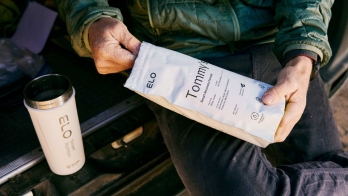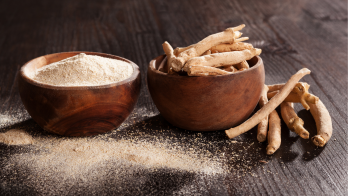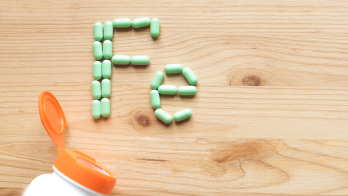What you need to know about collagen
Collagen has gained popularity in recent years for people hoping to promote better skin, stronger nails, healthier bones, and more. But does it live up to the hype? Here’s what science has to say about collagen, its health benefits, and if supplementation is the way to go.

If you’ve stepped foot in a grocery or health food store in the last few years, you’ve probably come across collagen in some shape or form. Since evidence suggests dietary collagen may have some skin, joint, and hair benefits, foods like bone broth, pigskin, and collagen supplements have become widely sought-after among wellness and beauty enthusiasts alike who are hoping to replenish their own collagen-containing tissues.
But what exactly is collagen, and should you be taking supplements to level up your health and wellness game? Here’s what the science says about collagen and its science-backed benefits.
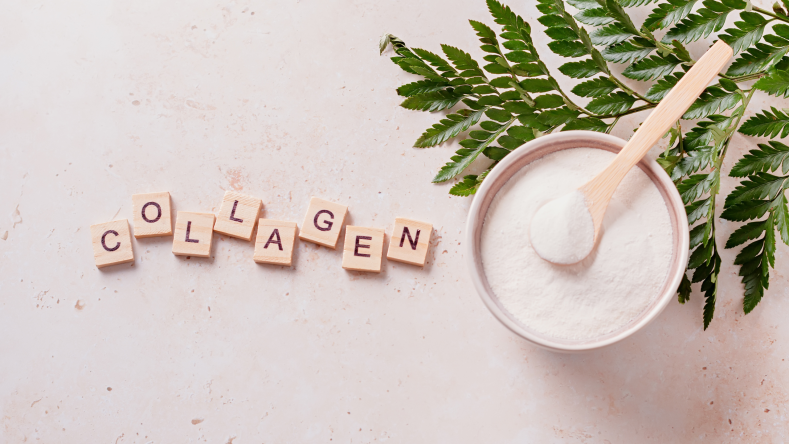
What is collagen?
Collagen is the most abundant protein in the human body, and is the main component of connective tissues (like skin, bone, tendons, ligaments, and cartilage) that provides structure, support, and protection throughout the body [ 1
Collagen is composed of three chains wound together to form a triple helix. This composition gives collagen rigidity, flexibility, and resistance to stretching essential for healthy bones, tendons, ligaments, cartilage, and skin [ 2
There are 28 different types of collagen, each with its own unique structure and function [ 1 3
Type I: this is the most common type, and is found in all connective tissue (including skin, bone, teeth, tendons, ligaments, vascular ligature, and organs)
Type ll: present in cartilage, including joints and intervertebral discs that act as your spine’s shock absorbers
Type lll: the main component of reticular fibers, which are found in your skin, muscle, and blood vessels
Type lV: a component of your kidneys, inner ear, and eye lens
What contributes to loss of collagen?
Collagen loss occurs naturally with age, contributing to wrinkling, as well as the weakening of bones, joints, and more. It starts gradually between 18–29 years of age, but by age 40, the human body can lose around 1% of its collagen per year. By the time you hit 80, your collagen production might be 75% less than when you were a young adult.
In addition to getting older, poor diet, sun exposure, drinking alcohol, and smoking can also contribute to collagen loss [ 3
Sources of collagen
You can obtain collagen through dietary sources or supplements. Let’s examine each of these in more detail.
Dietary collagen
Similar to the collagen in your own body, collagen is also found in the connective tissues of animals, including chicken, pork, beef, and fish [ 4
Non-vegan collagen supplements
Collagen supplements have become popular both for their convenience and potency, and are made from cattle, poultry, pig, fish, or other animal sources [ 3
The most common forms of non-vegan collagen supplements are [ 3 5 6
Hydrolyzed collagen (collagen peptides): Animal collagen that has been broken down into shorter amino acid chains for best absorption; collagen peptides typically contain Type I and/or Type III collagen.
Undenatured collagen: Type II collagen is typically made from raw chicken cartilage; several studies have used this type of collagen to assess its potential benefit on joint health.
Gelatin: Derived from cooked collagen from various animal sources.
However, the types of collagen found in supplements vary — some contain one or two types, while others contain several.
Type I and III: commonly used for skin, hair, and nails [
7
,10
,11
]Type II: often used for joint health [
14
]Type V and type X: involved in muscle, lung, liver, placenta, and bone health [
27
]. However, more research is needed to determine whether the body can use these types of collagen to support these areas.
Some collagen supplements also include vitamin C, as this nutrient plays an important role in the synthesis and maintenance of collagen and helps bind collagen fibers together. Because vitamin C must be obtained from the diet, some manufacturers choose to include it in their products; however, you can consume adequate amounts from foods like oranges, grapefruit, kiwi, bell peppers, broccoli, strawberries and Brussels sprouts.
Vegan collagen supplements
Vegan collagen products have become popular among people cutting back on or avoiding animal products altogether. While there is no natural source of vegan collagen, the majority of vegan collagen supplements contain ingredients (like silica, phytoceramides (plant-based fats), amino acids, minerals, antioxidants, and vitamin C) that promote the body’s natural production of collagen rather than supplying actual collagen.
You can also find these ingredients by eating a wide variety of fruits, vegetables, beans, legumes, nuts, and seeds containing the essential collagen ingredients like vitamin C, copper, zinc, and silicon. Moreover, foods like Brussel sprouts, spinach, strawberries, citrus fruit, berries, garlic, kale, bell peppers, papaya, and pumpkin seeds will benefit natural collagen production.
However, because vegan collagen supplements are newer to the supplement scene than animal-based collagen, there’s not much research on its benefits or risks [ 29
Benefits of collagen supplements
Research shows collagen may offer certain health benefits, particularly for aging skin, joints, bones, and muscles. Here are some science-backed benefits of collagen supplements.

Smoother, more supple skin.
The skin is the largest organ in the human body, and collagen is one of its major structural constituents, contributing to strength, elasticity, and hydration. As you age, your body produces less collagen (contributing to dry skin and wrinkling), which is why research suggests that collagen supplementation may help maintain or improve skin structure by stimulating your body to produce collagen on its own. Additionally, collagen supplements can promote the production of other proteins (like elastin and fibrillin) that help structure your skin [ 8
Studies have found that those who took oral hydrolyzed collagen supplements saw improvements in skin hydration, elasticity, and wrinkles after 90 days when compared to those who didn’t take collagen [ 7 9

Reduced joint pain.
As you age, your body naturally loses collagen, which increases your risk of degenerative joint disorders such as osteoarthritis [ 12 13
Scientists hypothesize that supplemental collagen may accumulate in joints and stimulate tissues to make collagen, potentially reducing pain and inflammation and improving joint health. It may also reduce the risk of joint deterioration in certain high-risk groups [ 13 15
Research also shows that athletes and non-athletes alike who took 10 g of collagen hydrolysate and hydrolyzed collagen, respectively, for 24 weeks experienced significant improvements in joint stiffness and self-reported joint pain [ 13 15 14
Stronger bones.
Collagen is the major component of bone mass and contributes to both its structure and strength [ 17 16 16
A clinical trial in postmenopausal women with reduced bone mass density found that those who took 5 g of collagen peptides daily for 12 months had increased bone mineral density in some areas by 6.7% compared to those who didn’t take collagen. Researchers also noted that women taking collagen experienced a favorable shift in bone markers that suggest an increase in bone formation and reduced bone degradation [ 17
Other preliminary evidence suggests collagen peptides may enhance the well-known benefits of calcium and vitamin D supplementation on bone health. Studies indicate that women with osteopenia who received 5 g of collagen peptides, 500 mg of calcium, and 400 IU of vitamin D had 11-13% decrease in markers of bone turnover compared to those who just took calcium and vitamin D [ 18]
Although these results are promising, larger human studies are needed to assess the long-term effects of collagen peptide supplementation on bone health and optimal timing and dosage related to the treatment of age-related bone loss.
Increased muscle mass.
Because collagen is also an essential component of skeletal muscle, its natural decline may contribute to sarcopenia (the loss of muscle due to aging or immobility).
Studies have demonstrated that sarcopenic men who did resistance training and took 15 g of collagen peptides/day experienced improvement in body composition and an increase in muscle mass and strength [ 19 19
Additionally, a study involving healthy, recreationally active men found those given 15 g/day of collagen peptides gained significantly more muscle mass and had slightly more significant increases in strength compared to those given a placebo after a 12-week resistance training program [ 20
Researchers theorize that supplemental collagen can help boost muscle mass by promoting the synthesis of muscle proteins and stimulating muscle growth after exercise [ 19 21
While these preliminary findings are promising, more high-quality studies are needed to explore collagen’s potential benefit in boosting muscle mass.
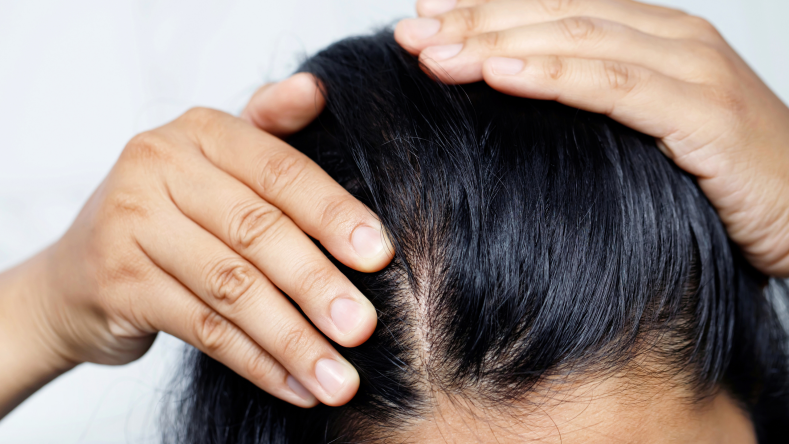
Possible improvements in hair and nail health.
Some studies have investigated the benefits of collagen for hair and nails, and have found that supplements may help reverse temporary hair thinning associated with poor diet, stress, hormonal influences, or abnormal menstrual cycles, as well as reduce nail brittleness and promote stronger, faster-growing nails [ 10 11
In one study, taking 2.5 g/day of collagen peptides for 24 weeks led to a 12% increase in nail growth rate and a 42% decrease in the frequency of broken nails [ 11
Another study found that women with thinning hair who took an oral supplement containing marine collagen, vitamin C and animal-derived sicilia perceived improvements in overall hair volume, scalp coverage, and thickness of hair body after 90 days compared to those taking a placebo [ 10
These studies are promising but far from conclusive as the current research is minimal and almost entirely funded by supplement manufacturers. If you have temporary hair thinning or want stronger nails, a collagen supplement may help, but more evidence is needed to prove this.
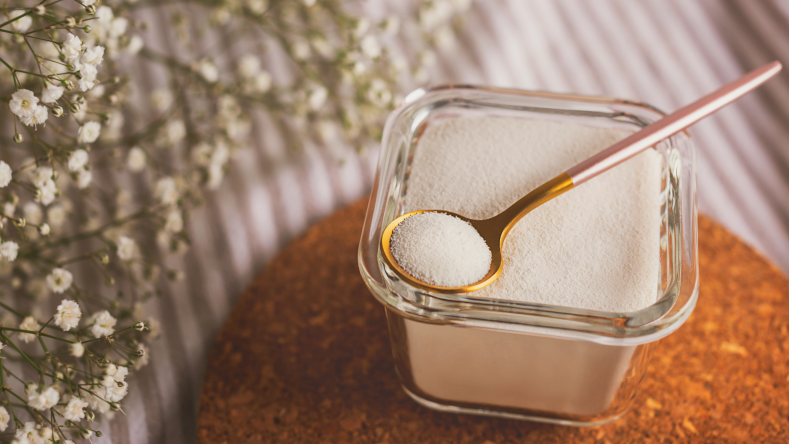
How much collagen should I take?
A review of clinical studies found that taking 2.5–15 g of hydrolyzed collagen peptides/day may be safe and effective; however, the amount of collagen you should take depends on the particular supplement and why you’re taking it [ 22
For skin: Research suggests taking 2.5-10 g/day of hydrolyzed collagen can reduce wrinkles and improve skin hydration and elasticity [
9
].For joint health: Human studies show doses of 10 g/day of hydrolyzed collagen or 10-40 mg/day of undenatured type II collagen may be beneficial for reducing joint pain associated with osteoarthritis as well as exercise-related joint pain in active adults [
13
,14
15
].For bones: Evidence suggests taking 5 g/day of hydrolyzed collagen may be beneficial for bone health [
13
,14
,15
].For muscle mass: In clinical studies, larger daily doses of 15 g of collagen peptides have improved muscle mass and body composition [
19
,20
].
How much collagen is too much?
Collagen is low in essential amino acids, which your body cannot make and must be obtained from the diet. Because of this, it’s important to include plenty of high-quality protein foods in your diet as well.
Research has shown that up to 36% of your daily protein intake can come from collagen peptides without sacrificing protein quality or amino acid balance [ 22 28
Depending on the benefit you’re seeking, current studies show taking 2.5-15 g/day of collagen peptides can produce positive effects. For example, even if you consume the minimum recommended amount of protein each day (0.8 g/kg), collagen intakes of 15 g/day will most likely account for less than 36% of your daily protein intake [ 23
How long does it take for collagen supplements to work?
Because collagen turnover is a slow process, it can take anywhere from 8 weeks to 12 months for collagen supplements to work. How long it takes depends on the particular supplement and why you’re taking it.
Fewer wrinkles and improved skin elasticity: Most studies show benefits in 8-12 weeks [
8
].Potential muscle mass and strength: Expect at least 12 weeks to see benefits [
19
,20
].Improved joint pain and stiffness: Studies show that benefits last an average of 24 weeks (about six months) [
13
].Increased bone strength: results may take up to 12 months [
13
,14
,15
].
Regardless of why you’re taking collagen, the benefits take time. Because collagen degradation increases with age, you’ll likely need to continue taking collagen daily for lasting effects.
Side effects of collagen supplements
Hydrolyzed collagen supplements are generally well tolerated with minimal side effects [ 24 25
Some people might also have stomach problems after taking undenatured collagen type II [ 26
Who shouldn’t take collagen?
While most people can safely take collagen, individuals with allergies to meat, fish, shellfish, and eggs should avoid collagen supplements made with these ingredients.
Additionally, you may want to hold off on taking a collagen supplement if you’re pregnant or breastfeeding since there isn’t enough research around whether or not they’re safe in these populations [ 24
Summary
Collagen is the most abundant protein in the human body and the main component of connective tissues, including skin, bone, tendons, ligaments, and cartilage [ 1 3 5 24 25
Disclaimer: The text, images, videos, and other media on this page are provided for informational purposes only and are not intended to treat, diagnose or replace personalized medical care.
Key takeaways
Collagen is the most abundant protein in the human body and the main component of connective tissues, including skin, bone, tendons, ligaments, and cartilage [
1
].Collagen loss occurs naturally with age, contributing to wrinkling and the weakening of bones, joints, and muscle loss.
Research suggests taking 2.5-10 g of hydrolyzed collagen per day can reduce wrinkles and improve skin hydration and elasticity [
9
].Human studies show doses of 10 g/day of hydrolyzed collagen or 10-40 mg/day of undenatured type II collagen may be beneficial for reducing joint pain associated with osteoarthritis as well as exercise-related joint pain in active adults [
13
,14
15
].Evidence suggests that taking 5 g/day of hydrolyzed collagen may benefit bone health [
13
,14
,15
].In clinical studies, larger daily doses of 15 g of collagen peptides have improved muscle mass and body composition [
19
,20
].You’ll likely need to continue taking collagen supplements daily for lasting effects.
References
Nezwek TA, Varacallo M. Physiology, Connective Tissue. [Updated 2021 Sep 20]. In: StatPearls [Internet]. Treasure Island (FL): StatPearls Publishing; 2022 Jan-. Available from:
https://www.ncbi.nlm.nih.gov/books/NBK542226/
Wu M, Cronin K, Crane JS. Biochemistry, Collagen Synthesis. [Updated 2021 Sep 13]. In: StatPearls [Internet]. Treasure Island (FL): StatPearls Publishing; 2022 Jan-. Available from:
https://www.ncbi.nlm.nih.gov/books/NBK507709/
León-López, A., Morales-Peñaloza, A., Martínez-Juárez, V. M., Vargas-Torres, A., Zeugolis, D. I., & Aguirre-Álvarez, G. (2019). Hydrolyzed Collagen-Sources and Applications. Molecules (Basel, Switzerland), 24(22), 4031.
https://doi.org/10.3390/molecules24224031
Liu, D., Nikoo, M., Boran, G., Zhou, P., & Regenstein, J. M. (2015). Collagen and gelatin. Annual review of food science and technology, 6, 527–557.
https://doi.org/10.1146/annurev-food-031414-111800
Van Vijven, J. P., Luijsterburg, P. A., Verhagen, A. P., van Osch, G. J., Kloppenburg, M., & Bierma-Zeinstra, S. M. (2012). Symptomatic and chondroprotective treatment with collagen derivatives in osteoarthritis: a systematic review. Osteoarthritis and cartilage, 20(8), 809–821.
https://doi.org/10.1016/j.joca.2012.04.008
Bolke, L., Schlippe, G., Gerß, J., & Voss, W. (2019). A Collagen Supplement Improves Skin Hydration, Elasticity, Roughness, and Density: Results of a Randomized, Placebo-Controlled, Blind Study. Nutrients, 11(10), 2494.
https://doi.org/10.3390/nu11102494
de Miranda, R. B., Weimer, P., & Rossi, R. C. (2021). Effects of hydrolyzed collagen supplementation on skin aging: a systematic review and meta-analysis. International journal of dermatology, 60(12), 1449–1461.
https://doi.org/10.1111/ijd.15518
Choi, F. D., Sung, C. T., Juhasz, M. L., & Mesinkovsk, N. A. (2019). Oral Collagen Supplementation: A Systematic Review of Dermatological Applications. Journal of drugs in dermatology : JDD, 18(1), 9–16.
https://pubmed.ncbi.nlm.nih.gov/30681787/
Evans, M., Lewis, E. D., Zakaria, N., Pelipyagina, T., & Guthrie, N. (2020). A randomized, triple‐blind, placebo‐controlled, parallel study to evaluate the efficacy of a freshwater marine collagen on skin wrinkles and elasticity. Journal of Cosmetic Dermatology, 20(3), 825–834.
https://doi.org/10.1111/jocd.13676
Glynis A. (2012). A Double-blind, Placebo-controlled Study Evaluating the Efficacy of an Oral Supplement in Women with Self-perceived Thinning Hair. The Journal of clinical and aesthetic dermatology, 5(11), 28–34.
https://www.ncbi.nlm.nih.gov/pmc/articles/PMC3509882/
Hexsel, D., Zague, V., Schunck, M., Siega, C., Camozzato, F. O., & Oesser, S. (2017). Oral supplementation with specific bioactive collagen peptides improves nail growth and reduces symptoms of brittle nails. Journal of cosmetic dermatology, 16(4), 520–526.
https://doi.org/10.1111/jocd.12393
Li, Y. S., Xiao, W. F., & Luo, W. (2017). Cellular aging towards osteoarthritis. Mechanisms of ageing and development, 162, 80–84.
https://doi.org/10.1016/j.mad.2016.12.012
García-Coronado, J. M., Martínez-Olvera, L., Elizondo-Omaña, R. E., Acosta-Olivo, C. A., Vilchez-Cavazos, F., Simental-Mendía, L. E., & Simental-Mendía, M. (2019). Effect of collagen supplementation on osteoarthritis symptoms: a meta-analysis of randomized placebo-controlled trials. International orthopaedics, 43(3), 531–538.
https://doi.org/10.1007/s00264-018-4211-5
Lugo, J. P., Saiyed, Z. M., & Lane, N. E. (2016). Efficacy and tolerability of an undenatured type II collagen supplement in modulating knee osteoarthritis symptoms: a multicenter randomized, double-blind, placebo-controlled study. Nutrition journal, 15, 14.
https://doi.org/10.1186/s12937-016-0130-8
Clark, K. L., Sebastianelli, W., Flechsenhar, K. R., Aukermann, D. F., Meza, F., Millard, R. L., Deitch, J. R., Sherbondy, P. S., & Albert, A. (2008). 24-Week study on the use of collagen hydrolysate as a dietary supplement in athletes with activity-related joint pain. Current medical research and opinion, 24(5), 1485–1496.
https://doi.org/10.1185/030079908x291967
Porfírio, E., & Fanaro, G. B. (2016). Collagen supplementation as a complementary therapy for the prevention and treatment of osteoporosis and osteoarthritis: a systematic review. Revista Brasileira de Geriatria e Gerontologia, 19(1), 153–164.
https://doi.org/10.1590/1809-9823.2016.14145
König, D., Oesser, S., Scharla, S., Zdzieblik, D., & Gollhofer, A. (2018). Specific Collagen Peptides Improve Bone Mineral Density and Bone Markers in Postmenopausal Women-A Randomized Controlled Study. Nutrients, 10(1), 97.
https://doi.org/10.3390/nu10010097
Argyrou, C., Karlafti, E., Lampropoulou-Adamidou, K., Tournis, S., Makris, K., Trovas, G., Dontas, I., & Triantafyllopoulos, I. K. (2020). Effect of calcium and vitamin D supplementation with and without collagen peptides on bone turnover in postmenopausal women with osteopenia. Journal of musculoskeletal & neuronal interactions, 20(1), 12–17.
https://www.ncbi.nlm.nih.gov/pmc/articles/PMC7104583/
Zdzieblik, D., Oesser, S., Baumstark, M. W., Gollhofer, A., & König, D. (2015). Collagen peptide supplementation in combination with resistance training improves body composition and increases muscle strength in elderly sarcopenic men: a randomised controlled trial. The British journal of nutrition, 114(8), 1237–1245.
https://doi.org/10.1017/S0007114515002810
Oertzen-Hagemann, V., Kirmse, M., Eggers, B., Pfeiffer, K., Marcus, K., de Marées, M., & Platen, P. (2019). Effects of 12 Weeks of Hypertrophy Resistance Exercise Training Combined with Collagen Peptide Supplementation on the Skeletal Muscle Proteome in Recreationally Active Men. Nutrients, 11(5), 1072.
https://doi.org/10.3390/nu11051072
Oikawa, S. Y., Kamal, M. J., Webb, E. K., McGlory, C., Baker, S. K., & Phillips, S. M. (2020). Whey protein but not collagen peptides stimulate acute and longer-term muscle protein synthesis with and without resistance exercise in healthy older women: a randomized controlled trial. The American journal of clinical nutrition, 111(3), 708–718.
https://doi.org/10.1093/ajcn/nqz332
Paul, C., Leser, S., & Oesser, S. (2019). Significant Amounts of Functional Collagen Peptides Can Be Incorporated in the Diet While Maintaining Indispensable Amino Acid Balance. Nutrients, 11(5), 1079.
https://doi.org/10.3390/nu11051079
Office of Dietary Supplements - Nutrient Recommendations: Dietary Reference Intakes (DRI). (n.d.). National Institutes of Health. Retrieved May 17, 2022, from
https://ods.od.nih.gov/HealthInformation/Dietary_Reference_Intakes.aspx
COLLAGEN PEPTIDES: Overview, Uses, Side Effects, Precautions, Interactions, Dosing and Reviews. (n.d.). WebMD. Retrieved May 17, 2022, from
https://www.webmd.com/vitamins/ai/ingredientmono-1606/collagen-peptides
Moskowitz R. W. (2000). Role of collagen hydrolysate in bone and joint disease. Seminars in arthritis and rheumatism, 30(2), 87�–99.
https://doi.org/10.1053/sarh.2000.9622
COLLAGEN TYPE II (NATIVE): Overview, Uses, Side Effects, Precautions, Interactions, Dosing and Reviews. (n.d.). WebMD. Retrieved May 17, 2022, from
https://www.webmd.com/vitamins/ai/ingredientmono-714/collagen-type-ii-native
Wang, H. (2021). A Review of the Effects of Collagen Treatment in Clinical Studies. Polymers, 13(22), 3868.
https://doi.org/10.3390/polym13223868
Berry, J. (2019, January 21). What to know about essential amino acids. Medical News Today. Retrieved May 24, 2022, from
https://www.medicalnewstoday.com/articles/324229
Fertala, A. (2020). Three Decades of Research on Recombinant Collagens: Reinventing the Wheel or Developing New Biomedical Products? Bioengineering, 7(4), 155.
https://doi.org/10.3390/bioengineering7040155



